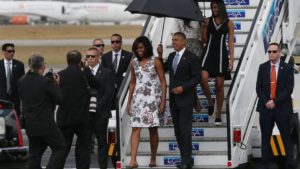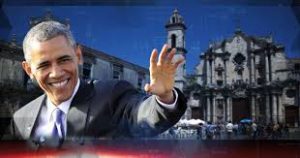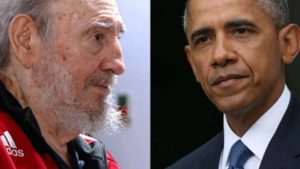SUMMARY OF EVENTS AFTER OBAMA’S VISIT TO CUBA.
After 90 days of their passage through Cuba, the balance of the presidential visit is still an open question.
Three months after the visit to Cuba by the United States President, Barack Obama, the echo of its main activities on the island still has an impact in Cuban society, the Communist Government that governs it, and its opponents.
“His visit will represent a breakthrough in the improvement of the relations”, said from the Cuban Ministry of Foreign Affairs, Josefina Vidal, responsible for negotiations with the United States when it disclosed the news of the visit.
From the beginning the White House emphasized that the visit sought to advance “the personal and business ties that could improve the well-being of the Cuban people” and express their support for human rights.
On the sidelines of meetings Protocol public and private political talks, the visit of Obama had three clear moments that could sign up in his column of credits: his speech at the great theatre of Havana, the press conference jointly with the managing Raúl Castro and his encounter with Panfilo, the popular Cuban comedian.
The telephone conversation between “the real Obama” and “the true Panfilo” first, and the television sketch featuring then, between the two, along with comedians checkbook and Facundo, was something that many Cubans never imagined view. And it’s five and a half decades of leaders and officials too solemn, away from the everyday simplicity of the ordinary citizen, to generate a deified their rulers image in the popular imagination. Sitting around a simple table of domino, on sleeves of shirt and loose tie, Obama delivered a blow to flinty gestures and of the Castro Government drama.
“It has been estimated that the video has been seen so far on the Web more than 2.3 million times, by people in the United States and in Cuba. Some have described it as the first Cuban viral video. That is even more remarkable considering that very few Cuban – only five percent, according to estimates – have access to Internet. Once it was broadcast by the State television, the video reached almost all Cuban households,”wrote on the web site of the White House, Terry Szuplat, Special Assistant to the President and Principal Director of redaction of discourses in the National Security Council of USA
The visit of Obama served for Raúl Castro will participate, for the first time since that came to power ten years ago, at a press conference, before foreign correspondents and the employees of the official press.
Bad speaking of Raul, coupled with its poor performance before the media, lack of ability or habit, showed much more differences both in the domain of Obama in such circumstances.
While Obama replied smiling, with fluency and clarity the questions, the managing transmitted the image of a hesitant elder, who was visibly angry when reporter of CNN, Jim Acosta, asked by the existence of political prisoners in Cuba.
“Show me the list. If there are these political prisoners, before it reaches the night will be loose,”replied annoyed.
More than one list, with accurate data, came to public light a few hours. Still those political prisoners waiting for the night when the Communist dictatorship released, as promised Raúl Castro.
Perhaps the most significant impact of the visit of Obama has to look for it in his speech of the Grand Theatre, broadcast live on national television.
There is no doubt that its ideological political content, marking with restraint and accuracy, the differences of democracy with the Communist regime, pulled out of balance to the nomenclature of the party and the Government.
It was another direct blow to traditional schemes of a single speech, repeated for half a century to half a dozen generations of Cubans. Also a subtle call for change of political direction, expressed just three weeks before the Communist Party of Cuba will open its seventh Congress and, ultimately, ended with more penalties and no glory.
Delivered before an audience selected by the authorities, the Obama speech was interrupted 32 times by applause that exceeded the limits of mere courtesy to scratching in the passing enthusiasm.
Neither slow nor lazy ideological counter-attack arrived the next day from the maximum official organs of the party and the Communist Youth.
As usual Fidel Castro opened the criticisms in an ironic reflection entitled brother Obama tap. “Comrade Fidel” revived laurels highlighting its “fundamental duty to respond to the speech of Obama at the great theatre of Havana Alicia Alonso”.
The call of Obama upset Castro in particular to forget the past and look to the future together. Such an idea, could have caused a collective heart attack heard who, said Castro, who again reviewed the long string of conflict between United States and Cuba, claiming honor and glory. “I also warn that we are able to produce food and the material wealth we need with the effort and intelligence of our people. We don’t need the Empire to give us nothing”, concluded assuming that you talked (wrote) on behalf of all.
The visit of Obama confirmed agreed with Raúl Castro in December 2014 to convert decades of clashes with commercial offers from telecommunications, services of regular airlines, greater cooperation in the law enforcement, the protection of the environment and various other topics.
So far the Cuban Communist dictatorship has benefited from the easing of American travel to Cuba, but for most Cubans the day-to-day shortcomings remain more or less the same in recent years.
By now the Cubans still have hopes for a better relationship with the United States, to impact in a positive way in the power, transportation, communications, water and the freedom of own private businesses, but if those expectations don’t materialize in the medium term, hope can feed a serious collective frustration.
Perhaps it is time to recall now, in this assessment, the optimism expressed by Ben Rhodes, vice President of national security adviser, when he met with independent journalists in Havana.
“The economic transformations of draught and political Court will arrive. This new policy will empower the Cuban people online. It will not be an easy road. They are policies that shall not be short-term.
Agencies/MartiNews/InternetPhotos/Excerpts/YouTube/Arnold Varona/TheCubanHistory.com
THE CUBAN HISTORY, HOLLYWOOD.
INTERROGANTES DESPUÉS DE LA VISITA DE OBAMA A CUBA.
Tras 90 días de su paso por Cuba, el balance de la visita presidencial es todavía una interrogación abierta.
Tres meses después de la visita a Cuba del presidente de Estados Unidos, Barack Obama, el eco de sus principales actividades en la isla todavía repercute en el seno de la sociedad cubana, en el gobierno comunista que la rige, y en sus opositores.
“Su visita representará un avance en la mejora de las relaciones”, aseguró desde la Cancillería cubana, Josefina Vidal, la encargada de las negociaciones con Estados Unidos cuando se divulgó la noticia de la visita.
Desde el principio la Casa Blanca insistía en que la visita buscaba avanzar “los lazos comerciales y personales que puedan mejorar el bienestar del pueblo cubano” y expresar su apoyo a los derechos humanos.
Al margen de las reuniones protocolares públicas y las conversaciones políticas privadas, la visita de Obama tuvo tres claros momentos que podrían apuntarse en su columna de créditos: Su discurso en el Gran Teatro de La Habana, la conferencia de prensa conjunta con el general-presidente Raúl Castro y su encuentro con Pánfilo, el popular comediante cubano.
La conversación telefónica entre “el verdadero Obama” y “el verdadero Pánfilo” primero, y el sketch televisivo protagonizado después, entre ambos, junto a los comediantes Chequera y Facundo, fue algo que muchos cubanos nunca imaginaron ver. Y es que cinco décadas y media de dirigentes y funcionarios demasiado solemnes, alejados de la sencillez cotidiana del ciudadano común, generan en el imaginario popular una imagen deificada de sus gobernantes. Sentado en torno a una simple mesa de dominó, en mangas de camisa y corbata suelta, Obama le propinó un golpe a los gestos adustos y al dramatismo gubernamental del castrismo.
“Se ha calculado que el video ha sido visto hasta el momento en la Web más de 2,3 millones de veces, por gente en EE.UU. y en Cuba. Algunos lo han descrito como el primer video viral cubano. Eso es aún más notable si se considera que muy pocos cubanos – sólo el cinco por ciento, según estimaciones – tienen acceso a Internet. Una vez que fue transmitido por la televisión estatal, el video llegó a casi todos los hogares cubanos”, escribió en sitio web de la Casa Blanca,Terry Szuplat, Asistente Especial del Presidente y Director Principal de Redacción de Discursos en el Consejo Nacional de Seguridad de EE.UU.
La visita de Obama sirvió para que Raúl Castro participara, por primera vez desde que llegó al poder hace diez años, en un conferencia de prensa, ante corresponsales extranjeros y los empleados de la prensa oficial.
La pésima oratoria de Raúl, unida a su pobre desempeño ante los medios, por falta de habilidad o de costumbre, evidenció mucho más las diferencias de ambos, ante el dominio de Obama en tales circunstancias.
Mientras Obama respondió sonriente, con fluidez y claridad las preguntas, el general-presidente transmitía la imagen de un anciano vacilante, que se irritó visiblemente cuando el reportero de la cadena CNN, Jim Acosta, le preguntó por la existencia de presos políticos en Cuba.
“Enséñame la lista. Si hay esos presos políticos, antes de que llegue la noche van a estar sueltos”, respondió molesto.
Más de una lista, con datos precisos, salieron a la luz pública a las pocas horas. Todavía esos presos políticos esperan por la noche en que la dictadura comunista los libere, como prometió Raúl Castro.
Quizás el impacto más trascendente de la visita de Obama haya que buscarlo en su discurso del Gran Teatro, difundido en directo por la televisión nacional.
No hay dudas que su contenido político ideológico, marcando con moderación y exactitud, las diferencias de la democracia con el régimen comunista, sacó de balance a la nomenclatura del Partido y del Gobierno.
Fue otro golpe directo a los esquemas tradicionales de un único discurso, repetido durante medio siglo a media docena de generaciones de cubanos. También una sutil exhortación al cambio de rumbo político, expresada apenas tres semanas antes de que el Partido Comunista de Cuba inaugurará su Séptimo Congreso y que, a fin de cuentas, concluyó con más penas y ninguna gloria.
Pronunciado ante un público seleccionado por las autoridades, el discurso de Obama fue interrumpido 32 veces por aplausos que sobrepasaron los límites de la mera cortesía para rayar en el entusiasmo aprobatorio.
Ni tardo ni perezoso el contraataque ideológico llegó al otro día desde los máximos órganos oficiales del Partido y la Juventud Comunista.
Como de costumbre Fidel Castro abrió el grifo de las críticas en una irónica reflexión titulada El hermano Obama. El “compañero Fidel” revivió laureles destacando su “deber elemental de responder al discurso de Obama en el Gran Teatro de La Habana Alicia Alonso”.
A Castro le molestó en especial el llamado de Obama a olvidar el pasado y mirar juntos el futuro. Tal idea, podría haber provocado un infarto colectivo a quienes lo escucharon, dijo Castro, quien repasó de nuevo el largo rosario de conflictos entre Estados Unidos y Cuba, reclamando honor y gloria. “Advierto además que somos capaces de producir los alimentos y las riquezas materiales que necesitamos con el esfuerzo y la inteligencia de nuestro pueblo. No necesitamos que el imperio nos regale nada”, concluyó asumiendo que hablaba (escribía) en nombre de todos.
La visita de Obama confirmó lo acordado con Raúl Castro en diciembre de 2014 para convertir décadas de enfrentamientos con ofertas comerciales de telecomunicaciones, servicios de líneas aéreas regulares, una mayor cooperación en la aplicación de la ley, la protección del medio ambiente y varios otros temas.
Hasta ahora la dictadura comunista cubana se ha beneficiado con la flexibilización de los viajes de estadounidenses a Cuba, pero para la mayoría de los cubanos las carencias cotidianas continúan siendo más o menos las mismas de los últimos años.
Por ahora los cubanos todavía tienen esperanzas de que una mejor relación con Estados Unidos, repercuta de manera positiva en la alimentación, el transporte, las comunicaciones, el agua y la libertad de poseer negocios privados, pero si esas expectativas no se materializan a mediano plazo, la esperanza puede alimentar una grave frustración colectiva.
Quizás es el momento de recordar ahora, en este balance, el optimismo expresado por Ben Rhodes, vice asesor de Seguridad Nacional del presidente, cuando se reunió con periodistas independientes en La Habana.
“Las transformaciones económicas de calado y de corte político van a llegar. Esta nueva política va en la línea de empoderar al pueblo cubano. No será un camino fácil. Son políticas que no se verán en corto plazo.
Agencies/MartiNews/InternetPhotos/Excerpts/YouTube/Arnoldo Varona/TheCubanHistory.com
THE CUBAN HISTORY, HOLLYWOOD.







